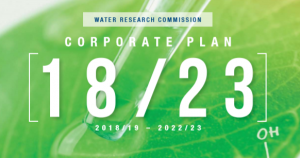Download the WRC Annual Performance Plan 2023-24 here
Download the WRC Strategic Plan 2023 - 2028 here
The world as we know it is changing. The Water Research Commission’s Corporate Plan 2018/19– 2022/23 (CP18) has been developed with a strategy that adapts to the ‘new normal’, conditions at the end of the most recent El Niño event – globally the worst in 20 years and which plunged North America, Africa and Asia into some of the most challenging dry conditions in recent times, and South America into some of its most devastating floods.
The World Economic Forum 2017 Global Risk Report shows, over the past decade, a cluster of environment -related risks, especially extreme weather events, failure of climate change mitigation and adaptation as well as the water crisis that has emerged as a consistent risk in the portfolio of global risks. These are interconnected with many other risks; however, the environmental concerns are more significant as the risks in this category have been assessed as being ‘above average’, in terms of both their impact and likelihood to occur.
In South Africa, we steadily, but very slowly, ease out of drought, with the Western Cape struggling through what has been called its worst drought in 100 years, and this also reflects the Southern Africa picture. At the same time South Africa has shown changing weather patterns with this part of the world becoming steadily drier over the past 20 to 50 years with milder wet seasons and increasingly severe dry seasons. The world had its hottest year in 2015, a few of its hottest months ever in 2016, and a continuing warming trend in 2017.
While this has been the pattern for the past decade globally and for the past three decades in Southern Africa, the public discourse is still that of waiting to return to a more familiar time. It is time to consider this as the ‘new normal’. The best science we have available to us in the form of weather and climate prediction says that this is either the new normal – or a very long period of transition to a different weather and climate pattern, that may be even harsher on the back of global climate change.
Adaptation to the ‘new normal’ CP18 is textured in a solution-oriented vector and does not consolidate the data and information to mourn the new normal, but to work out a range of interventions to enable a sustainable development pathway in the new normal. This is characterised as follows;
- A new research agenda and a new way of doing that research, not just inter-sectorally and in a transdisciplinary manner, but predominantly in partnership with the practitioner and user communities.
- Bringing together the little pockets of knowledge and solutions in different parts of the world for greater impact through smart and generous international collaboration.
- Re-visiting the regulatory environment and current infrastructure paradigm.
- A strategy that enables sustainable development and ensuring universal access to basic services in the new normal will be characterised by creativity, innovation and a system amenable to dynamic adaptation and improvement.
- An internal strategy that adapts to a new normal by straddling the fine line between what has traditionally worked and what will work in the future, based on the needs, strengths and mind-set of the current and future workforce. Each new generation is progressively more Internet- and technology-focused, and more social responsibility focused. With this in mind the world of work focuses on human resources, information technology, governance and facilities in an integrated approach. This approach will ensure that the WRC will move to the next level in terms of business success and employee satisfaction.
- An interactive, multidirectional exchange of knowledge and ideas that is reflected in the research dissemination approach.
- A financial strategy that creates an agile income stream and sound financial reporting and compliance.
The effective and sustainable management of the country’s limited water resources is essential for community health, development and cohesion, as well as continued economic activity. Research and development, along with innovation, has long since been recognised by Government as holding the key towards ensuring a water-secure future for the country.

